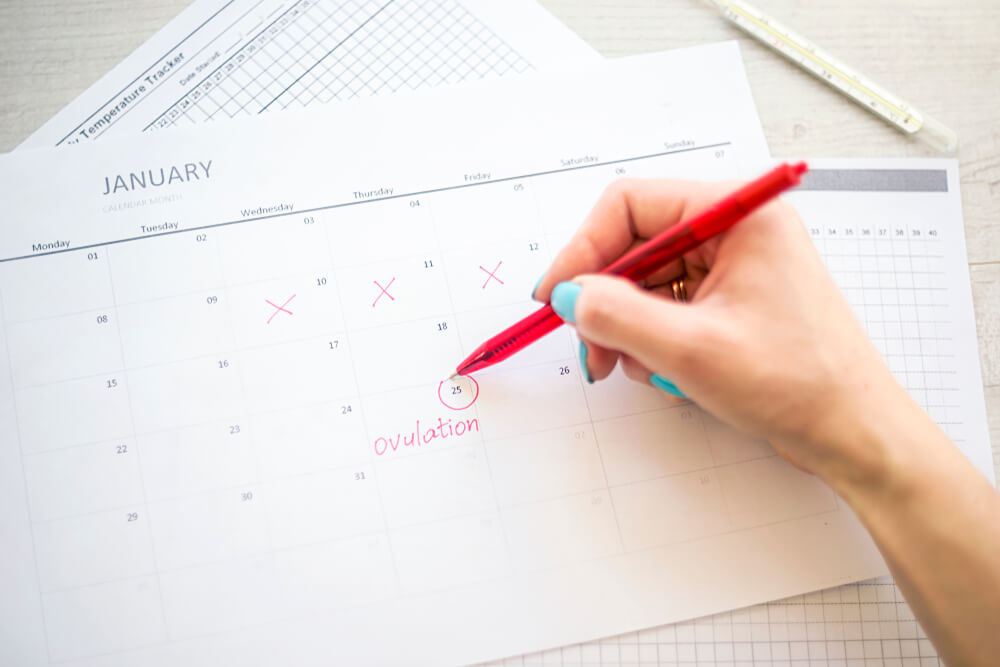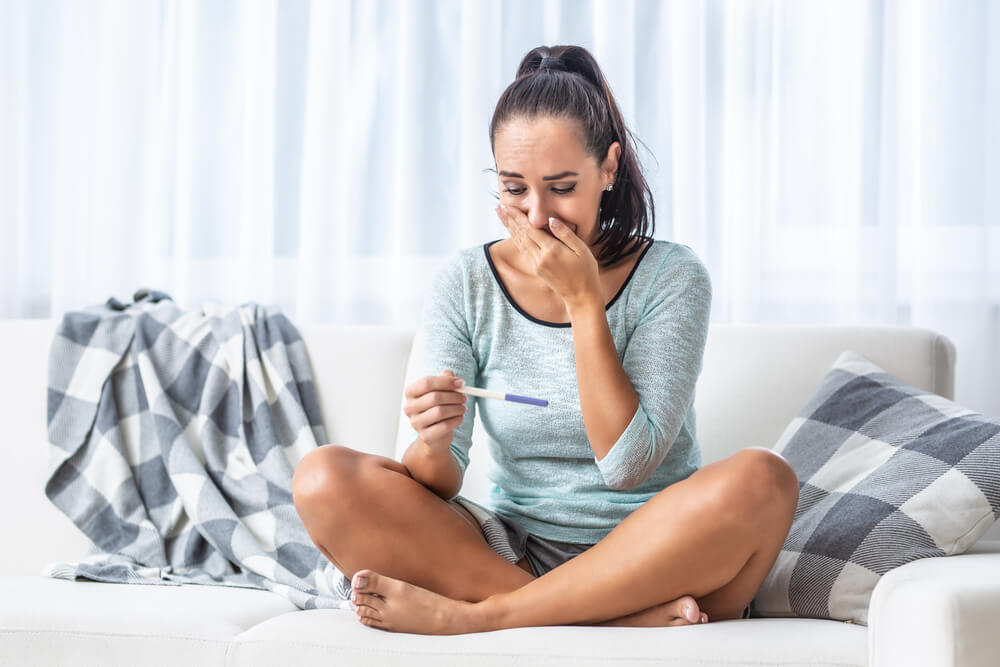Disclaimer: Please note that this blog is for educational purposes only, it includes general information on health-related topics. Women’s Healthcare of Boca Raton is giving medical advice to Patients Only. Follow this link to request an appointment with Dr. Ellman.
As a woman, you’re more likely to conceive during your ovulation period than on other days. Some women also experience some symptoms that can indicate that they’re ovulating, such as breast tenderness, increased sexual desire, and light ovulation spotting.
Ovulation tests can also determine whether you’re ovulating, to help increase your chance of getting pregnant.
So, how long after a positive ovulation test are you fertile? When is the best time to take an ovulation test?
In this article, we’ll talk more about ovulation and the types of ovulation tests you can use.
When Does Ovulation Occur?
Ovulation occurs when your ovary releases an egg (ovum) which travels through your fallopian tube to the uterus. The ovum usually takes five days to reach your uterus, and this increases progesterone levels to help prepare the uterine lining for pregnancy.
That said, the ovum becomes fertilized if it comes into contact with the male reproductive cell (sperm) in the uterus.
Ovulation usually occurs once a month between days 6 and 14 of a woman’s menstrual cycle. However, an average woman with a 28-day cycle is likely to ovulate on the 14th day.
It is important to note that you may not ovulate on the same day of every month.
Further to that, when you’re ovulating, you may experience:
- An increase in your sexual drive
- Breast tenderness
- Abdominal pain
- Fertile cervical mucus as there is an increase in estrogen levels
- An increase in your body temperature
- Ovulation pain
The signs of ovulation vary from person to person, and not everyone can tell when they’re ovulating.
This is where ovulation tests come in.
Let’s discuss: When to take an ovulation test.
When to Take An Ovulation Test

If you’re not sure when you should be ovulating or don’t notice any changes in your body during this period, you can resort to an ovulation test.
Ovulation tests are similar to a pregnancy test, as they can help predict the time when your fertility will be at its peak. The best time for you to do an ovulation test is in the middle of your menstrual cycle.
Moreover, women with a 28-day cycle may find it easier to determine when they’re ovulating, but ovulation tests can be helpful for those who have an irregular cycle.
When you notice your ovulation cycle is unstable, you may have to take ovulation tests more often. According to research, you can use these tools at any time of the day, but it is best to test in the morning.
In addition, we recommend reducing the quantity of water you consume some hours before using an ovulation test. This is because the luteinizing hormone (LH) levels in your urine increase just before your ovulation, and too much liquid intake can reduce these levels and give you an inaccurate result.
How Long After a Positive Ovulation Test Are You Fertile?
The only time you can conceive is during your ovulation period, as it is when your ovum is in the process of traveling to your uterus that you are most fertile.
If the test indicates that you’re ovulating, your ovary should release an egg within 1 – 3 days after a positive ovulation test. Then it is immediately ready for fertilization.
You can have sex with your partner two days after getting a positive ovulation test. The egg can survive for 24 hours after it is released, and the male’s sperm can stay in the woman’s body for as long as five days.
Types of Ovulation Tests
To know your ovulation period, you can use these tests:
Ovulation Kits
When you’re ovulating, there will be an LH surge in your urine.
Ovulation kits work by checking the amount of LH levels present in your urine to determine when you’re in your ovulation period.
Ovulation test strips cannot tell you the exact time when your ovary will release an egg to your uterus. Some women may also have an LH surge without releasing any eggs, as this increase can occur if they have an underlying health condition.
That said, the primary function of these kits is to let you know when your ovulation is near to increase your chance of getting pregnant.
Accuracy
Ovulation test strips may not always produce accurate results if you drink too much water before using the kit, are pregnant, or are going through menopause.
Using Ovulation Test Strips
Making use of an ovulation test strip is simple. You are to pee in a container and dip the strip in the urine. If you’re in your ovulation period, the test line will look darker than the control line.
Before ovulating, the salt level in your saliva also increases, and so, you can use a salt-based ovulation test to detect these concentrations.
You can carry out this test by yourself by spitting on a flat object. When it dries, you can use a magnifying lens to view it. If your saliva has a high salt concentration, it will have a fern appearance. This means that you’re ovulating.
Blood Tests
Blood tests can help determine if you’re ovulating. When there is an increase in the level of progesterone and LH in your blood, then you’re ovulating. You can visit a women’s health clinic to carry out this test.
Basal Body Temperature Test
Your temperature level rises during your ovulation period. You can use this test to monitor your temperature every day during your ovulation period. The lowest temperature you experience is when you’re most fertile.
Fertility Monitor
Fertility monitors are digital devices that predict the time for your ovulation by measuring the level of salt and electrolyte in your saliva and the levels of your LH.
These can also store your ovulation information.
You can contact our obstetricians in Boca Raton if you wish to know more about these monitors.
If you’re wondering how soon after ovulation can you test for pregnancy, keep on reading to find out.
How Soon After Ovulation Can You Test For Pregnancy

The placenta produces the human chorionic gonadotropin (hCG) hormone when you’re pregnant, and you can detect this in your urine. The hCG levels increase during the early pregnancy phase, so testing too early can lead to a false-negative result.
That said, if you get a positive ovulation test and you have sex with your partner on that day, then you should take a pregnancy test in the next eight days.
How Can Ovulation Tests Help
Ovulation tests can be beneficial, especially if you have an irregular menstrual cycle.
That said, below are some of the benefits that come with ovulation test strips, fertility monitors, and other types of ovulation tests that you can use:
- They determine when you’re most fertile.
- You don’t have to guess when you’re ovulating or when ovulation is near.
- They can increase your chances of getting pregnant.
- They’re easy to use, but you should always consult your doctor to ensure you’re using them correctly to avoid any inaccurate results.
Contact Us Today
When you’re ovulating, you may develop various symptoms, such as spotting, pain, and increased sexual desire.
However, some women don’t experience these changes in their bodies, and it can be difficult for them to determine when they’re during their ovulation period. As a result, they may use ovulation test kits to know when they’re the most fertile, especially if their menstrual cycle is irregular.
If you have more questions or want to know more about how and when to take an ovulation test, you can call our clinic at (561) 273-7364 or (561) 465-8834. Our OB-GYNs at Women’s Health Care of Boca Raton look forward to helping you in your fertility journey.

Dr. Ellman is a Board Certified OBGYN who established his medical practice in South Florida over 25 years ago. His office, Women’s Healthcare of Boca Raton, is located in Boca Raton, Florida at West Boca Medical Center. Dr. Ellman attended Albert Einstein College of Medicine of Yeshiva University, where he received his medical degree. He went on to intern at Beth Israel Hospital in Boston- an affiliate of Harvard Medical School- and continued his residency at North Shore University Hospital in Manhasset, New York- an affiliate of Cornell Medical School.
Dr. Ellman has practiced Obstetrics and Gynecology in the Boca Raton area since 1995. In addition to treating patients at West Boca Hospital, Dr. Ellman also treats patients through his own private practice, Women’s Healthcare of Boca Raton, located on the West Boca Medical Campus.

